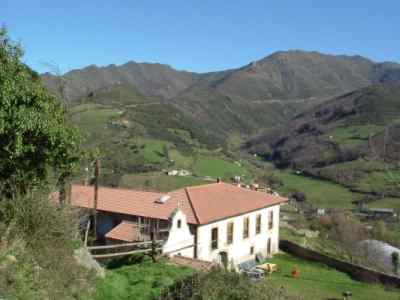| About Us | Contact Us | Member Database | Contact Database | Support Us |
August 22-29, 2004, Spain
 Pola
de Lena, Asturias, Spain.
Pola
de Lena, Asturias, Spain.
Organised by Escanda and INFORSE-Europe
Hosted by Escanda (INFORSE-member), Spain.
The seminar was aimed at fostering exchange and increasing communication between people working, from different points of view and areas of activity, towards a transition to sustainable and democratic energy production and use. The seminar covered a broad range of separate but interconnected themes, including the transition away from fossil fuels and nuclear energy and towards renewable energies, climate change and emissions trading, liberalisation of the energy markets, control of resources, etc.
The initial objectives and contents that INFORSE and Escanda proposed for the seminar were:
- Bringing together people working on positive alternatives to the oil and nuclear industries and people active in denouncing them and campaigning against destructive companies and projects. Fostering more cross-polinisation between the "practical" and the "political", in order to strengthen the efforts done from all sides for positive social change.
- Discussing our role in a just transition from fossil / nuclear energy production towards renewables. Promoting bottom-up, participatory grassroots projects in the energy sector (renewable energy cooperatives, energy efficiency measures, etc), particularly in economically marginalised regions (such as Asturias where the seminar is being held, where a once thriving and now uncompetitive coal mining industry has been almost entirely dismantled). Fostering more exchange between groups working on these kinds of initiatives.
- Exploring the connections between ownership and control
of resources (energy reserves, power distribution networks, etc), the
liberalisation
of the energy sector, international institutions and agreements
(such as the World Trade Organisation, the EU, etc.) and problems
such as climate
change, dependency, etc.
Discussing the Kyoto Protocol and the Climate Convention (with a particular focus on Emissions Trading, Joint Implementation and other controversial elements). - Exploring the connections between fossil fuel dependency,
global political / economic / military processes and the clash of
civilisations theory
(and other racist tools for social engineering). Looking
at the North-South dimension of energy policies, control of resources
and armed conflict.
Developing a scheme for the exchange of young volunteers working in organisations active in these fields all over Europe. - Building up communication, cooperation and networking tools
between renewable energy networks and grassroots political
mobilisation
networks in order
to increase public awareness about the effects of fossil
and nuclear energy production, the shortcomings of existing
political
measures, and
the alternatives.
Discussing the new international cooperation for renewable energy (follow-up from the Bonn International Conference on Renewable Energy, June 2004, the Johannesburg Renewable Energy Coalition etc.), and how to link them with practical, local and NGO-based activities.
The final program was made in a participatory way with the groups interested in attending the seminar. The program included a brief presentation of Escanda, INFORSE -Europe, and other participating NGOs as well as of Escanda's project to create a locally-owned renewable energy cooperative in Lena (where the seminar took place).
- See more detailed
information of the Program and Presentations at Escanda's
homepage Sustainable
Energy & Social Change Seminar at
Escanda, August 2004, Spain.
The Presentations, Seminar Reader, and Pictures were moved away from the site,
but you can find some of them under the the Seminar
description and under Recursos/
Resources. Look for the power point presentations under titles: "Presentación
de los Seminarios de Escanda", and "Presentación del Proyecto
'Energías Renovables para Beneficio Local' ".
Contact for
the Seminar was Kolya
Abramsky who is not at Escanda any more, but can still be contacted by kolyaab@yahoo.co.uk.
More
information on Escanda:
ESCANDA: www.escanda.org
E-mail:
escanda-info@gmx.net, ph/fax: + 34 985 493696.
(Links updated in 2008)